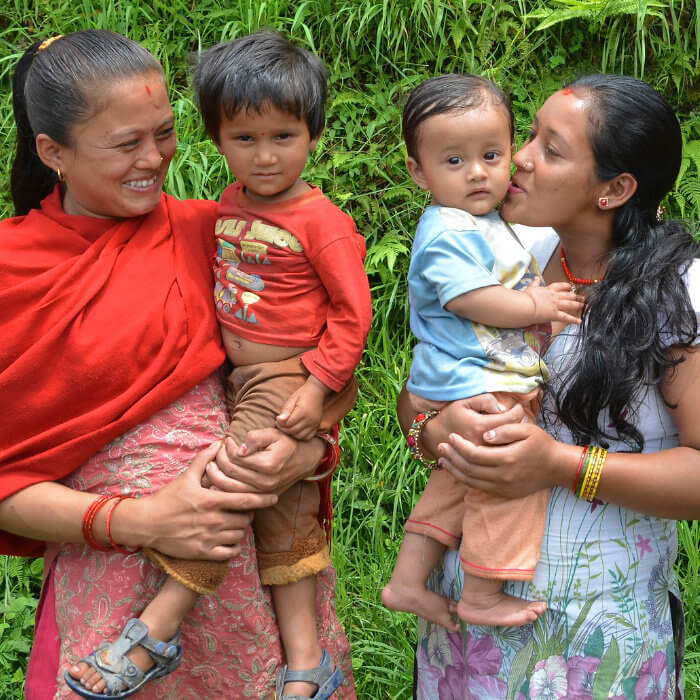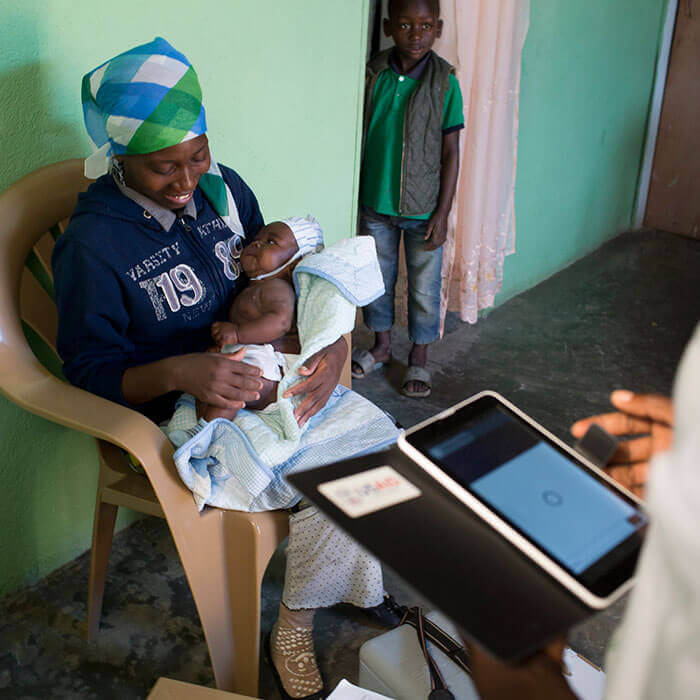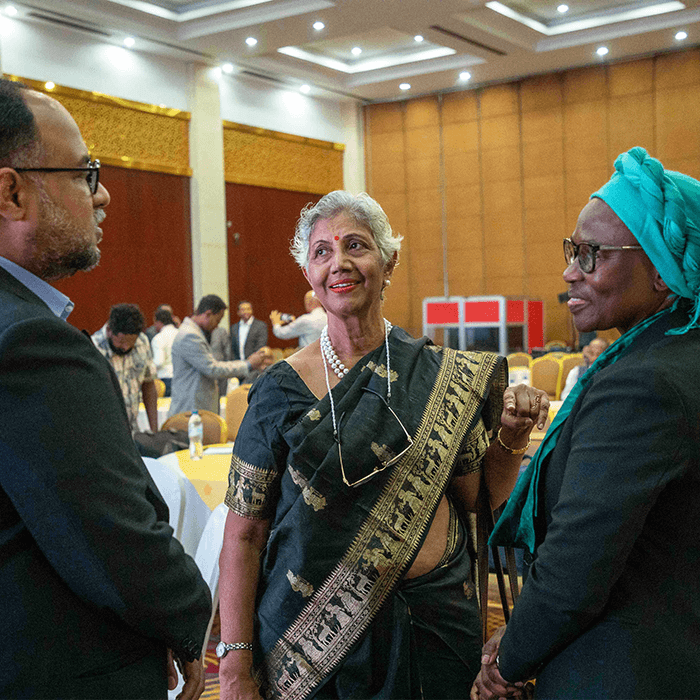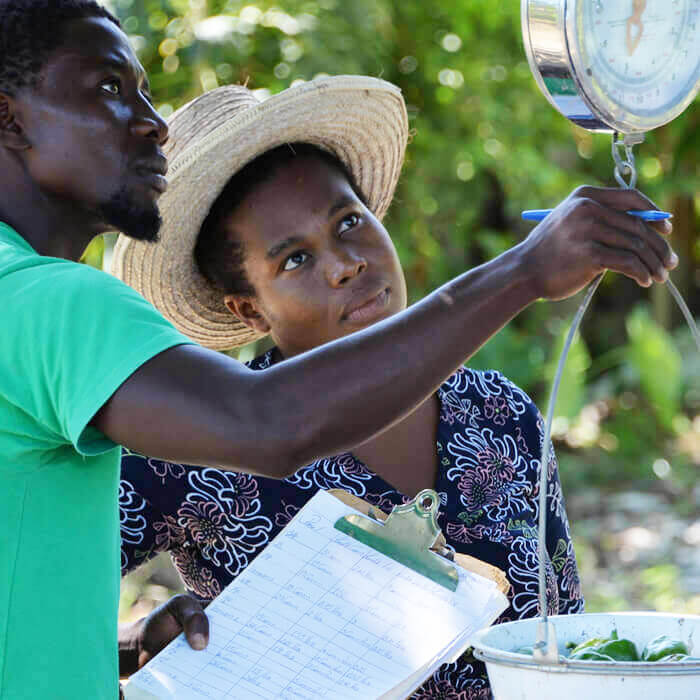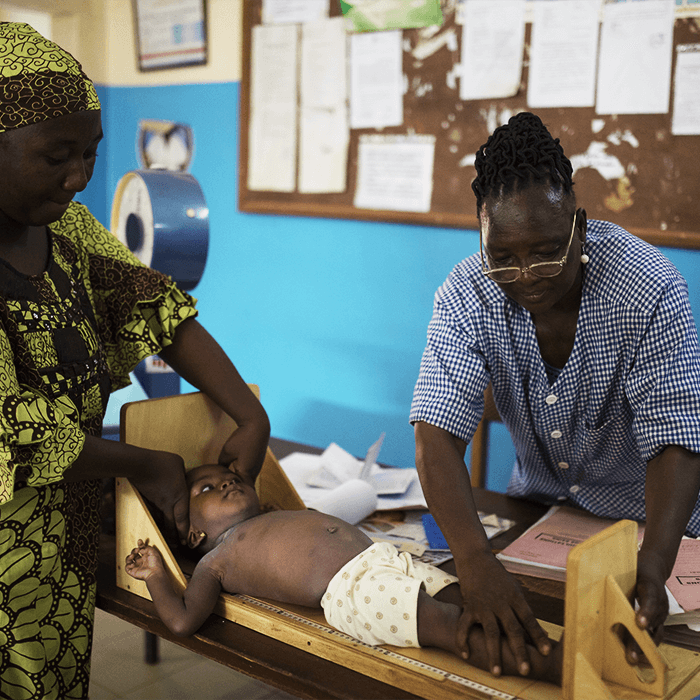Results for Development works with change agents at the global, regional and country level to end malnutrition in all its forms through improved financing and use of evidence to ensure maximum impact, including key investments in other sectors that have the potential to reduce malnutrition.
Nutrition
The Challenge
Malnutrition represents one of the most formidable challenges of the 21st century. High rates of malnutrition prevent people from reaching their full potential and it can also make them more vulnerable to disease and other health problems.
But the current statistics on malnutrition are staggering. According to the United Nations, over 45 percent of deaths of children under five globally can be attributed to malnutrition. Over 768 million people worldwide are undernourished. More than 149 million children under five are stunted (too short for their age) and over 45 million children suffer from wasting (are too thin for their height).
Recent global events, including increasing food costs, ongoing conflicts, climate change, and the lingering effects of the COVID-19 pandemic have led to a rise in hunger, while simultaneously hindering global efforts to eradicate malnutrition.
At the same time, unhealthy diets are a leading driver of the global burden of disease. There is a need to transform food systems.
Fortunately, momentum to address malnutrition has been ramping up over the past decade. This is evident in new donor commitments and progress toward the global nutrition targets in the Global Investment Framework for Nutrition and the Global Action Plan for Child Wasting. Now, we need to stay on course — mobilizing more funding and finding ways to maximize existing investments across all sectors to get more nutrition impact out of every dollar spent.
Our Approach
R4D helps to mobilize funding and other resources to address malnutrition — and we work to maximize the return on these investments. We also help decision makers use evidence and data to make better decisions about how to address malnutrition.
We support local leaders to strengthen their capacity to scale up nutrition interventions. And we make important connections among change agents working in different sectors to address malnutrition — including health, agriculture, WASH, social protection and education. We help forge the partnerships required for effective, integrated programs.
R4D works with global, regional and country change agents to integrate nutrition in both health systems and food systems with three cross-cutting, strategic approaches: (1) Evidence Generation and Translation, (2) Sustainable Nutrition Financing and (3) Governance and Multi-sectoral Coordination.
Examples of our Approaches in Action Include:
Evidence Generation and Translation
- R4D and UNICEF worked with country leaders to co-produce a novel 6-step guide for governments on integrating early detection and treatment of child wasting into routine primary health care. In Ethiopia, R4D partnered with the Ministry of Health to adapt and apply this global evidence, creating a 3-year operational plan to implement them. Though severe acute malnutrition treatment was already being integrated in most health facilities through Ethiopia’s Health Extension Program, the new plan expands services for moderate acute malnutrition. It also increases efficiency by utilizing the existing workforce and reducing reliance on parallel systems. And it increases sustainability by strengthening health sector ownership and leadership.
- The 2021 UN Food Systems Summit encouraged governments to harness the power of food systems to benefit people and the planet. To support decision-makers and better define what it means to take a food systems approach, R4D and City University of London created a package of resources for policymakers that includes helps decision-makers engage stakeholders, estimate costs and write policies.
- R4D, Johns Hopkins University and the International Food Policy Research Institute (IFPRI) are implementing the DataDENT initiative to improve nutrition data availability and use. DataDENT addresses gaps in nutrition data, advocates for stronger nutrition data systems and assesses efforts to strengthen nutrition data capacity in low- and middle-income countries. R4D’s focus includes developing a framework for costing strategic plans and recommending financing strategies for nutrition data systems at the global level, and in Ethiopia and Nigeria.
- R4D developed a Nutrition Investment Toolkit for the Millennium Challenge Corporation (MCC) to guide the integration of nutrition considerations into large-scale MCC investments. The toolkit promotes a nutrition-smart approach, assessing how investments across sectors impact nutrition. It identifies nutrition-related activities with the best return on investment. And it recommends tools for measuring and modeling benefits from interventions that are intentionally designed to improve food systems, health, and nutrition outcomes. R4D continues to support MCC with training, dissemination, and application of the toolkit’s resources.
Sustainable Nutrition Financing
- R4D hosts the new Finance Capacity Development Platform (FCDP) for SUN countries with partners Spark Health Africa and Health Strategy and Delivery Foundation (HSDF). FCDP is a country-led platform that provides tailored support, demand-driven tools and resources and opportunities for peer-to-peer exchange with the goals of increasing funding for nutrition and ensuring more strategic use of funding to accelerate impact on nutrition outcomes.
- Through the sustainable financing for nutrition (SUSTAIN) project, R4D supports the governments of Nigeria, Ethiopia, Ghana and Malawi in their efforts to increase country-level financing for nutrition. We do this by strengthening the capacity of government and local partners to develop evidence based sustainable financing strategies across sectors. In Nigeria, 17 states developed sustainable financing frameworks for nutrition. In Ethiopia, R4D supported the Ministry of Health to develop a Resource Mobilization Plan for the Seqota Declaration Scale Up and Expansion Phases, which the government used to mobilize domestic resources. In Ghana and Malawi, R4D supported the development of national and sub-national frameworks to guide sustainable nutrition financing.
- In 2017, the World Bank, R4D and 1000 Days created the Investment Framework for Nutrition as a roadmap to achieve the WHA nutrition targets by 2025. Since then, R4D has tracked donor disbursements to priority interventions to monitor progress toward these financial benchmarks. This annual analysis provides valuable insight on donor spending for wasting, stunting, anemia, exclusive breastfeeding, and enabling environment interventions, informing advocacy efforts to drive more and better financing for nutrition in the future.
Governance and Multisectoral Coordination
- R4D is supporting Ethiopia’s Ministry of Health (MOH) to mobilize sustainable financing to achieve the goals of the Seqota Declaration — Ethiopia’s commitment to end stunting among children under two by 2030. We are supporting the MOH to collect and analyze nutrition funding data across regions and providing training and tools to strengthen the government’s capacity to manage and track health resources annually. R4D also worked with change agents to engage diverse nutrition stakeholders from across the country to strengthen sustainable financing for nutrition including planning, costing, budget and expenditure analysis, financial data use for decision-making, resource mobilization and accountability.



